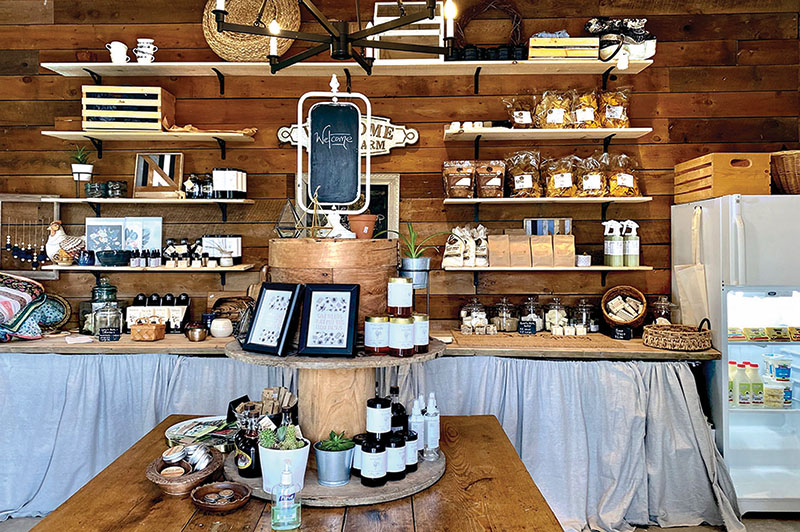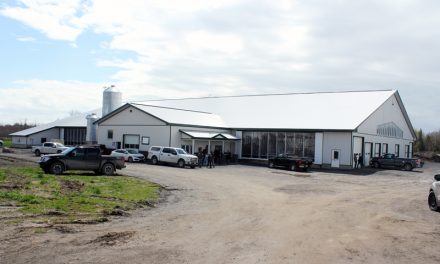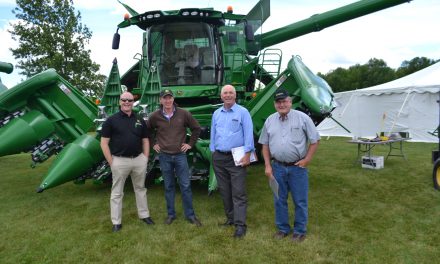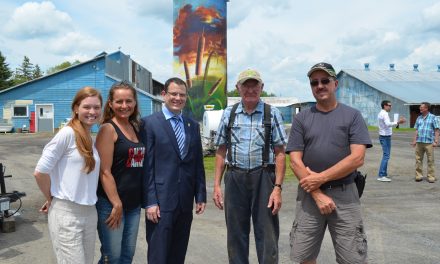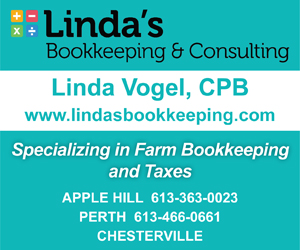Samantha and Ben Baynham established a micro-farm, called Louck’s Pastures in Chesterville, Ont. Courtesy Photo
By Vanessa White
AgriNews Contributor
CHESTERVILLE – When Samantha and Ben Baynham were looking to buy a small farm in South Dundas for their young family, they found land prices to be prohibitively high.
After initially looking at larger properties, the family settled on a 10-acre property on Loucks Road near Chesterville.
The small land size did not deter the young couple who had a dream of establishing a farm business to supplement their off-farm income. They started their micro-farm, Louck’s Pastures, with only a few chickens, sheep, pigs and bees and sold their products at the local farmers’ market.
Micro-farms have become more common in the past few years, mainly in vegetable production. The concept of micro-farming is to concentrate on efficiency over size. They have become popular in areas where agricultural land is limited or expensive. The Baynham’s are still working on infrastructure but are planning to increase efficiency every year through intensive rotational grazing and multispecies grazing as well as potentially adding a market garden.
When Samantha was at the local market, she was hearing that there was a need for a one-stop shop for people looking to buy local food. Another comment from the farmers themselves was that while they liked the idea of direct marketing their products, they either did not have the time or the inclination to do so. That was the moment the idea of starting an on-farm store that connected farmer to consumer was conceived.
Traditionally, producers have turned to the farmers’ market to direct sell to consumers. Baynham emphasized that she does not think that farm stores should replace markets but complement them.
Most markets require the producer to be personally selling their product and that can be a challenge for some. Also, some small farmers do not have enough products to warrant renting a market stall.
Baynham is no stranger to entrepreneurial ventures. She started her graphic design business at age 22 and has helped several start-up companies with marketing and branding. Some of the inspiration for the store came from Baynham’s clients who had opened stores on their farm in order to direct market their products.
The store opened in January 2021 selling lamb, honey, pork and local beef on Saturdays. They have since expanded their products to include grass fed milk, goat’s milk soap, herbal salve, maple syrup, locally roasted coffee and gifts.
Marketing for the store has been done primarily through social media and word of mouth. “A good social media presence is essential for a small business in this era,” said Baynham, “customers really appreciate feeling connected to their food and we benefit from their comments and questions.”
The farm store has been well received by the community and customers appreciate being able to support small business and local food at the same time. “The feedback I am hearing is that people are really excited to see us open up and they hope to see more farms do something similar, as we are the first farm store in the area,” Baynham remarked.
One of the challenges facing the business model is that it is difficult for small producers to sell products at a wholesale amount and therefore profit margins are smaller. The goal is to create a complete shop local experience so that customers can get their groceries for the week. And then as the customer base and sales grow, the profit margin for the producer can be higher.
As interest in local food and food security rises, Baynham expects to see other farms start their own farm stores and roadside stands. “I don’t see it as competition; there are a lot of consumers out there and the more people we can convince to buy local food [the more it] is a win for small farmers,” she concluded.
For more information about Louck’s Pastures go to: https://www.louckspastures.com or call 613-898-3459 or email: samantha.baynham@gmail.com

